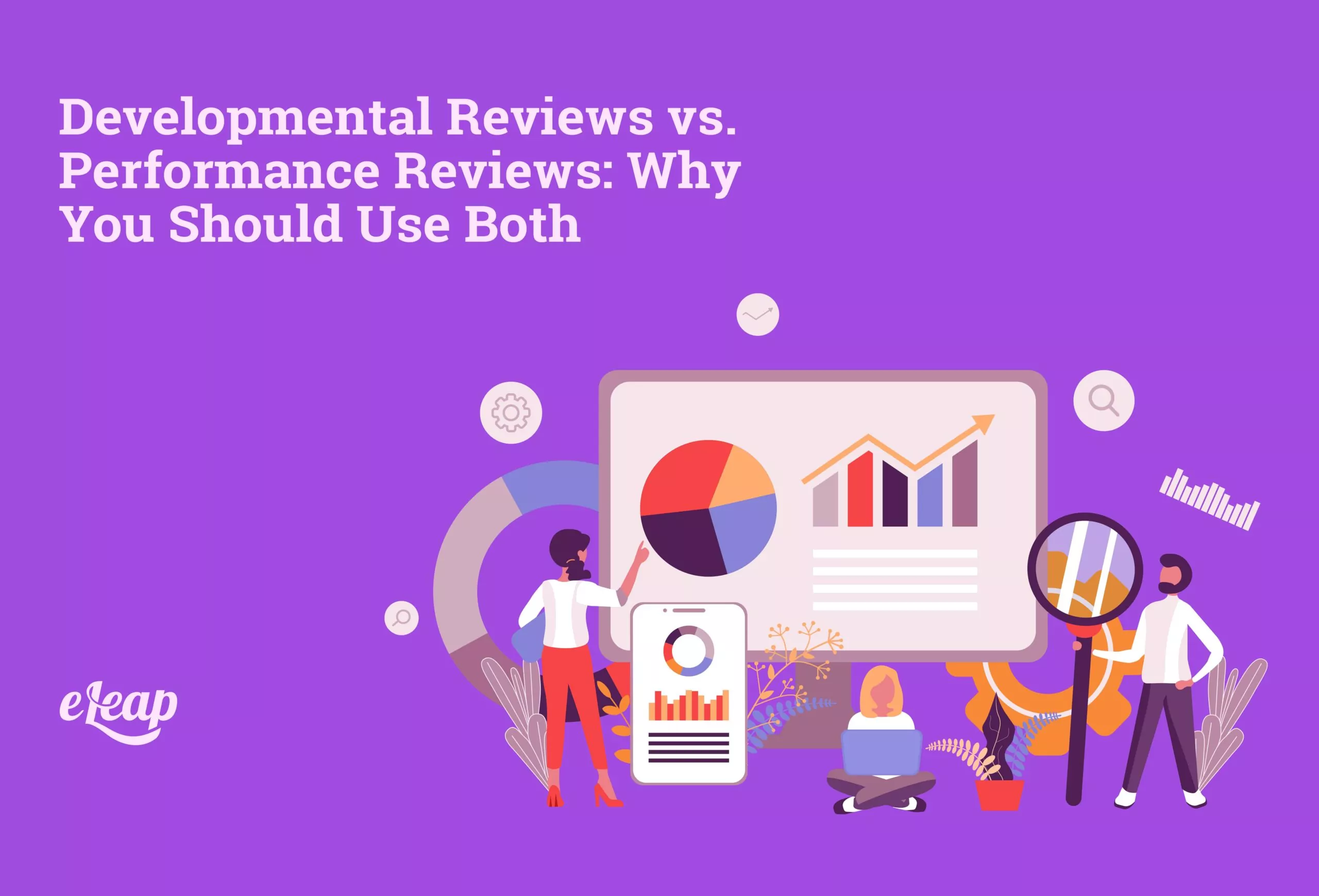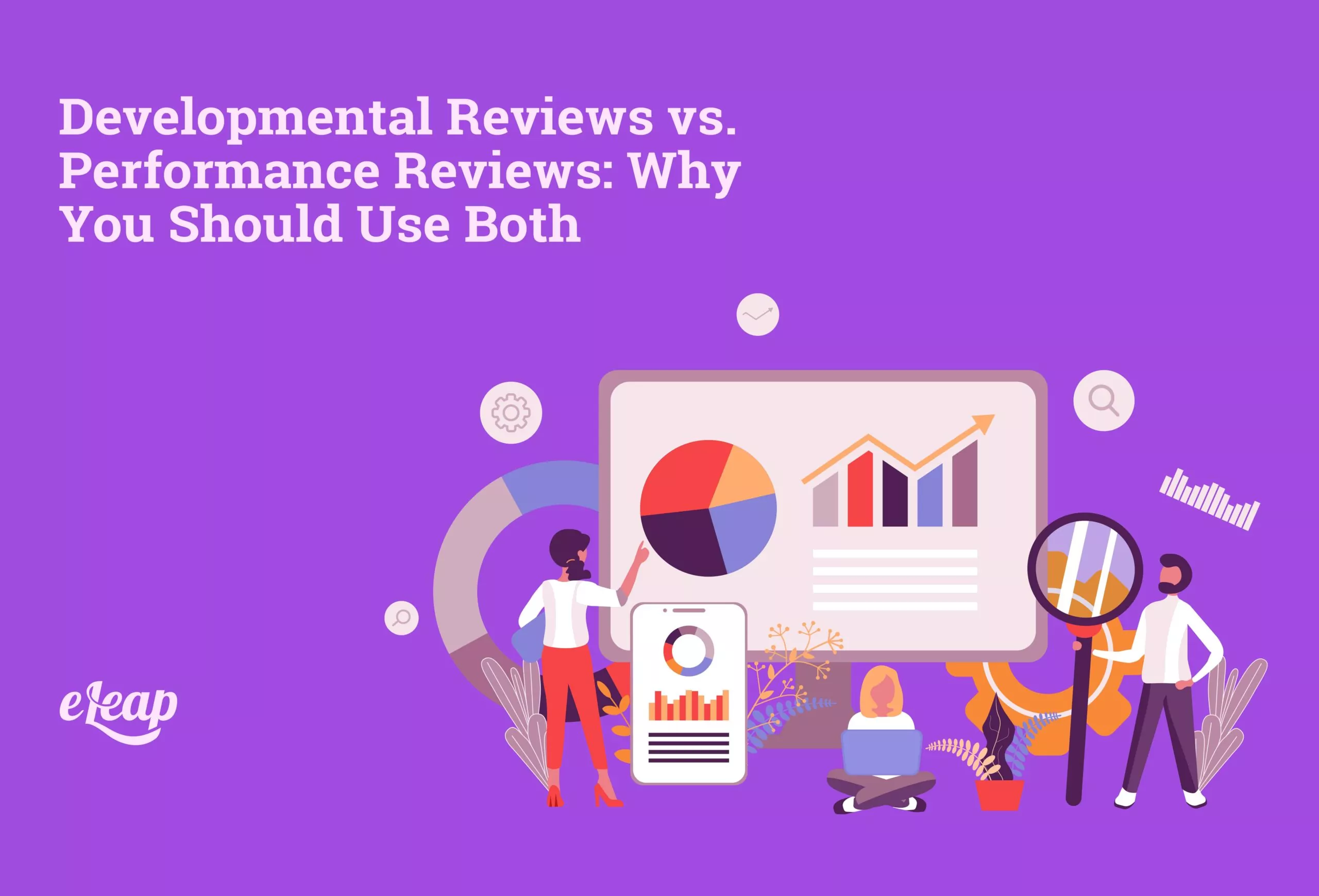Developmental Reviews vs. Performance Reviews: Why You Should Use Both

There’s a significant difference between developmental reviews and performance reviews. You should understand the difference if you’re running an organization within a corporate setting. Explore how eLeaP’s Performance Management Platform can simplify evaluations, boost productivity, and drive measurable results.
Developmental reviews are more aimed at team member growth and hitting goals. Performance reviews are more based on work performance and using appropriate skill sets.
One seems to be more focused on the goals of the employee, while the other is more focused on the overall health of the organization. At the very least, performance management ensures employee goals match corporate values and objectives.
In any corporate setting, it’s important to use a healthy mix of both. If you’re not aware of what each of these reviews entails, this article highlights them and why you should incorporate each.

What are Developmental Reviews?
Developmental reviews are used to promote growth. This means that they must identify skill gaps within an employee or areas that they want to grow. These reviews address how a team member can proactively approach this improvement desire.
The most important thing to remember is that developmental reviews don’t just address performance problems. Team members who are thriving in their positions may still benefit from a developmental review that helps increase their skills.
What are Performance Reviews?
Performance reviews are an important tool for performance management. These are focused on assessing your team members’ performance over a specific period.
These reviews normally evaluate the efficiency of an employee’s work based on predetermined metrics of success. Normally, these areas have nothing to do with an employee’s own personal or professional growth goals.
Instead, they are created based on the demands of their job. Performance reviews normally ensure that an employee’s performance aligns with an organization’s goals or strategic objectives.
From a company’s standpoint, these reviews can identify stand-out employees who may deserve a bonus. This makes it easier to reward team members who have a positive attitude or other important traits.
How are Developmental Reviews Different from Performance Reviews?
Let’s examine how developmental reviews and performance reviews are different in greater detail. We’ll also discuss why you should separate performance management and development.
1. Purpose
These types of reviews have two clear purposes. Performance reviews are created to assess performance over a time period that’s already passed. Developmental reviews are forward-focused and intend to help team members grow.
Assessing a team member’s past or current performance and assisting them in developing for the future are critical parts of performance management.
2. Who Leads Them
Another way that developmental and performance reviews differ is in who leads the review process. Managers often lead performance reviews. Usually, this is done with input from other leaders and other team members. Normally, employees are the sole receivers of these assessments.
Developmental reviews are led by employees themselves. This allows them to define the areas they want to focus on more and improve.
3. Level of Uniformity
Another huge difference is the lack of uniformity between these two types of reviews. Performance reviews are normally consistent across all employees within a company, department, or position. This means that calibration is vital.
With developmental reviews, content is specific to each team member. This means it’s possible that no two review discussions will be the same. They will instead vary based on the individual.
Why are Both Important?
Developmental and performance reviews fulfill different purposes and serve complementary roles. This is why both are crucial to promoting an effective performance management system.
Research has shown that providing employees with the chance to grow and hit their goals is the strongest driving force behind the corporate culture. Professionals want to work for an organization that cares about their success.
When you give employees developmental reviews, this is a great way to promote that growth. This leads to more satisfaction and engagement from employees. It can also produce a more profitable company.
Performance reviews also play a key role for your company and team members. These reviews help you determine how well team members’ performance is aligning with expectations and standards.
At the corporate level, this helps you identify patterns of success or potential gaps that must be corrected. When it comes to the individual employee, it lets them know how they’re doing and can help your organization plan for success.
These reviews also work hand-in-hand. For example, in the case of a performance review, areas of improvement may emerge that can help you craft better developmental reviews.
When combined, these types of reviews make sure team members are equipped with the opportunities, tools, resources, and feedback they need for growth. This also guarantees your organization has the information it needs to plan for a successful future.
What Makes Effective Developmental Review?
The following elements will lead to a successful developmental review process.
- They are constructive and straightforward
- They lead to team members taking action
- They help with personal goals and development
What Makes Effective Performance Review?
You should consider the following elements as part of a successful performance review system.
- They are focused on specific areas
- They are standardized to avoid bias and subjectivity
- They are frequent or ongoing
The last element is extremely important in terms of performance review. Gone are the days when performance review was conducted once per year. It’s important that this takes place on a constant, ongoing basis in order to provide the most relevant and accurate assessment.
A developmental review will help your team members grow and feel well-supported. You should definitely consider making one of these platforms a part of your performance review.
Stay Up on Reviews
It’s also critical that you prioritize performance reviews and follow the best practices involved with this process. These reviews give your team members and company valuable information to help you build towards the future.
Conducting performance reviews can be a huge task for management. This is especially true when it comes to meeting with team members to discuss feedback. Having a healthy combination of these types of platforms is essential for your organization.
The eLeaP continuous performance management system provides organizations with powerful options to attract and retain high-caliber team members.